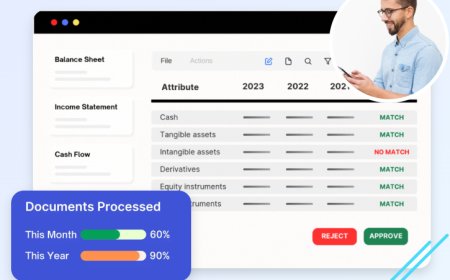Your Money, Your Rules: Simplifying Personal Finance

Managing your personal finances doesn't have to be overwhelming. The truth is, most people never received formal education about budgeting, saving, or investing. But the good news? Its never too late to start taking control. With a few clear strategies and a shift in mindset, you can make smart choices with your moneywithout needing to become a financial expert.
This guide breaks down the essentials of personal finance into manageable parts. Whether you're looking to get out of debt, build savings, or plan for retirement, this post will give you the tools to start. Lets walk through the basics and make personal finance simplerbecause its your money, and your rules.
1. Start with a Clear Picture of Your Income and Expenses
You cant manage what you cant see. The first step in personal finance is understanding where your money goes. It might sound basic, but many people dont have a real sense of what they earn and spend every month.
Track your spending.
Write down everything you spend for a monthevery coffee, lunch, bill, and subscription. You can use apps like Mint, YNAB (You Need A Budget), or even just a spreadsheet.
List all sources of income.
Include your main job, side hustles, freelance work, or any other sources of cash flow.
Once you have both sets of data, subtract your expenses from your income. If the number is negative, youre spending more than you earnand that needs to be fixed right away. If its positive, good startbut its what you do with that leftover money that counts.
Tip: Dont forget occasional costs like car maintenance, gifts, or yearly insurance bills. These need to be included in your budget to avoid surprises.
2. Set Realistic Financial Goals
Without goals, saving and budgeting feel pointless. But when you set clear, achievable financial goals, its easier to stay on track and feel motivated.
Short-term goals (under a year):
-
Build an emergency fund of at least $500$1,000
-
Pay off high-interest credit card debt
-
Save for a vacation or large purchase (like a laptop)
Mid-term goals (15 years):
-
Save three to six months of living expenses
-
Pay off student loans or car loans
-
Build a down payment for a home
Long-term goals (5+ years):
-
Invest for retirement (401(k), IRA)
-
Start a business
-
Pay off your mortgage early
Set specific dollar amounts and timelines. Save $5,000 in 12 months is better than save more. Once youve defined your goals, you can build a plan around them.
3. Build and Follow a Budget That Works for You
A budget isnt about restrictionits about intention. Its choosing in advance where your money goes, so youre not constantly reacting to bills or wondering where your paycheck went.
Try the 50/30/20 Rule:
-
50% Needs: Rent, groceries, utilities, insurance
-
30% Wants: Dining out, entertainment, hobbies (even that vape stick habit if its important to you)
-
20% Savings/Debt Repayment: Emergency fund, retirement, loans
Not every budget works for every person. If you live in a high-cost city, your "needs" might be closer to 60% or 70%. Adjust the percentages to fit your life.
Helpful tips for sticking to your budget:
-
Automate savings and bills
-
Use cash envelopes for areas where you overspend
-
Revisit your budget monthly and adjust as needed
Budgeting doesnt have to be perfect. Even tracking loosely and making intentional choices can dramatically improve your financial outlook over time.
4. Spend Intentionally, Save Automatically
Lets talk about real-life spending. We all have leaks in our budgetsmall purchases that add up. Think about subscriptions you forgot to cancel, daily takeout meals, or impulse buys like throwaway vape devices or gadgets. These seem minor but can drain hundreds over the year.
How to be a more intentional spender:
-
Pause before any purchase over $25do you really need it?
-
Compare cost to hours worked: is that item worth 2 hours of your time?
-
Delay gratification. Make a wishlist instead of buying immediately.
At the same time, put your savings on autopilot. Treat saving like a billnon-negotiable and scheduled.
Ways to automate:
-
Direct deposit a portion of your paycheck to a savings account
-
Use round-up apps that save spare change from every purchase
-
Set recurring transfers to your investment or emergency accounts
When you automate saving, its easier to build financial security without having to think about it constantly.
Bonus Section: Mindset and Habits Matter More Than Math
You dont need to be a math whiz or an investment expert to take charge of your finances. In fact, financial success is more about habits and mindset than numbers.
Here are a few mindset shifts that help:
-
Progress beats perfection. Dont wait until you have it all figured out. Start small and build over time.
-
Avoid comparison. Just because someone drives a fancy car doesnt mean theyre financially secure. Focus on your goals, not their lifestyle.
-
Build financial habits into your routine. Weekly money check-ins, monthly budget reviews, and yearly goal setting can keep you grounded and moving forward.
Youre in charge of your money, not the other way around.
A Quick Word About Modern Spending Trends
Modern life has changed how we spend. Subscriptions, online shopping, social media adsits easier than ever to spend without realizing it.
Sometimes it helps to evaluate recurring expenses through a value vs. cost lens. For example:
-
That streaming service you rarely use? Cancel it.
-
Your vape stick purchase every week? Consider switching to a refillable device or cutting back to save.
Even if it's just two small habits you adjust, those savings add up. And being mindful helps you feel more in control.
Final Thoughts: Make Finance Fit Your Life
Personal finance isnt one-size-fits-all. Your lifestyle, goals, and priorities are uniqueand your financial plan should reflect that. The key is to take small, consistent steps. Start by tracking your money, setting a few realistic goals, and building habits that support the life you want.
Its your money, and your rules. No one else can decide whats important for you. But when you take the time to understand and manage your finances, you open up new options, reduce stress, and build a more secure future.









































